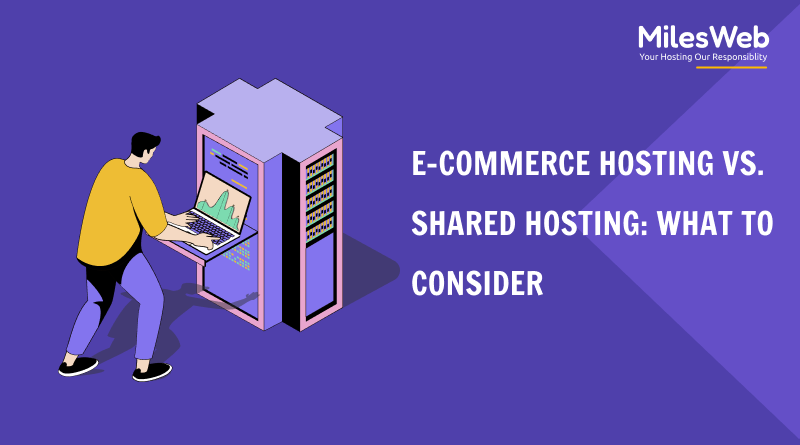It is a must for any online business to consider a perfectly suitable hosting solution for its success. Businesses and individuals need to understand the various types of hosting and the services available to make an informed choice concerning the hosting and all associated services for your business. While shared hosting is perhaps the cheapest option for small websites and blogs, the eCommerce hosting platforms offer specialized solutions for online stores that are focused on performance, security, and scalability. Therefore, in this article, we explain the key differences, advantages, and considerations before choosing the right hosting services for businesses.
Shared Hosting Simplified
Shared hosting is a basic of hosting service where many websites share the same server resources. Thus, it becomes quite affordable for personal blogs, small business websites, and portfolio websites. However, as the resources are being shared among several websites it can lead to performance and security issues, so it is not an apt choice for very high-traffic ecommerce stores.
Pros and Cons of Shared Hosting
Pros
- Low Cost: Best suited for small businesses and budding websites that may have little budget.
- Simplicity of Administration: Most hosting providers have straightforward installation of any CMS platform like WordPress with just a click.
- No Need for Technical Knowledge: Maintenance of the server and security updates will be taken care of by the hosting provider.
Cons
- Limited Resources: Shared CPU, RAM, and bandwidth could slow down processing speed in times of high traffic.
- Security Issues: If any of the other websites are compromised, that can put your website in danger, security-wise.
- Scalability: Websites expecting high traffic would not benefit from these hosting options.
E-commerce Hosting Explained
E-commerce hosting pertains to online stores, being specialized for performance, security, and scalability. It also incorporates special features that can be beneficial for e-commerce websites such as SSL certificates, dedicated resources, PCI compliance, and support for platforms such as Magento, WooCommerce, and Shopify.
Pros and Cons of E-commerce Hosting
Pros
- Very High Performance and Scalability: Provides dedicated resources to deliver fast loading and great performance.
- Robust Security Features: Strong security with SSL, firewalls, and regular backups to ensure that customer data always remains protected.
- Better Uptime and Reliability: Built to withstand heavy and sudden traffic demands.
Cons
- More Expensive: Higher on the price scale than shared hosting, given additional advanced options.
- Need Some Technical Knowledge: Management of the store may require some technical knowledge and expertise.
Shared Hosting vs. E-commerce Hosting- Key Differences
| Features | Shared Hosting | Ecommerce Hosting |
| Performance | Limited resources, slower speeds | High-speed servers with dedicated resources |
| Security | Security through WAP, malware scanner, and so on | Advanced security with SSL, DDoS protection |
| Scalability | Limited, may struggle with traffic spikes | Highly scalable to accommodate business growth |
| Customization | Standardized setup, limited configurations | Fully customizable to fit business needs |
Other Crucial Elements to Consider When Choosing Between Shared and E-commerce Hosting
Website Purpose
- If you’re running a blog or a small business website, shared hosting is a low-cost option.
- If you’re starting an online store, then e-commerce hosting should be the better option for you in terms of performance and security.
Traffic Outlook
- Shared hosting should cater to low-traffic websites.
- E-commerce hosting should take care of those high levels of traffic and customer interactions without any trouble.
Security Considerations
- Go for e-commerce hosting for more protection if you handle sensitive customer data.
- Shared hosting can put your online transactions at risk due to the lack of advanced security measures.
Budget Factor
- Cheap but limited resources would describe shared hosting.
- E-commerce hosting will call for higher investment but will guarantee performance and reliability.
Technical Support & Management
- If you are looking for easy-to-manage hosting with little resource management required from your side, then shared hosting may be a good option.
- If you need specialized support for your eCommerce store, pick a hosting provider offering dedicated help.
Final Thoughts
What is important is an understanding of web hosting that serves the necessity of your website with its long-term objectives. For small websites, shared hosting serves best; but for doing online business, there ought to be eCommerce hosting to safely and efficiently sell products. Thus, the right investment in hosting plan avails an uninterrupted customer journey, prime performance, and business expansion.
Need assistance choosing the right plan? Get in touch with great hosting solutions for feature-rich business hosting today!


